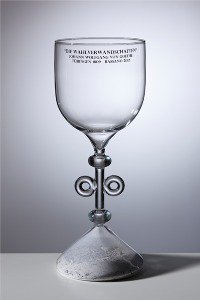Antonio Riello
dal 22/10/2012 al 30/11/2012
Segnalato da
22/10/2012
Antonio Riello
Salon Vert Gallery, London
Diabolus in vitro. Two large scale wall-mounted installations of objects made from Venetian glass and drawings. Riello creates a 'virtual library' immortalising his most loved and venerated books, like medieval reliquaries each glass contains the vestiges of 'sacred' literary knowledge.

curated by James Putnam
Curated by James Putnam, "Diabolus in vitro" is Riello’s first solo exhibition in the UK and with Salon Vert, comprising of two large scale wall-mounted installations of objects made from Venetian glass and drawings.
Spending his childhood surrounded by books in an immense library compiled by his mother, Riello grew up to become a bibliophile– a book addict with a possessive instinct for holding on to his most treasured volumes. In the installation Ashes to Ashes the artist presents a new kind of library - a taxonomic style display of elegant Venetian glass chalices, each hand-blown in a unique design. Within the stem of each glass is encapsulated the ashes of a burnt book. Through this sacrificial artwork, Riello creates a ‘virtual library’ immortalising his most loved and venerated books, from children’s classics to Kafka, Freud and Plato. As he puts it they are “precious relics of self-inflicted biblioclasm“ and allude to the historical tradition of burning books to suppress heretical religious doctrines or to keep alchemical knowledge secret. Like medieval reliquaries each glass contains the vestiges of ‘sacred’ literary knowledge. They also symbolize the notion that books are becoming relics of the past with the growth of eBooks in our technologically reliant future, Riello’s ‘library’ is an ongoing project began in 2010. Presented at Salon Vert are the new books created specifically for the show and in the largest ever version of 100 books.
As a material glass has a neutral, impartial quality that Riello finds ironically appropriate for imparting emotional contexts. Civil War is an installation that consists of 100 handguns cast in opaque white Murano glass. He regards glass as a metaphor for fragility and this arsenal of pistols symbolizes aggressive behaviour, which in turn alludes to social and psychological fragility and insecurity. This installation continues the artist’s fascination with the ambivalence of violence and society’s need for aesthetics. His work often involves philosophical explorations that draw on aspects of history, craftsmanship and the epistemology of objects.
Although Riello frequently creates installations it is difficult to categorize his practice as confined to any particular form of artistic expression since it includes outdoor sculptures, site-specific installations, displays of crafted objects, drawing and photography. Yet his work can be seen as distinctly sculptural in the broadest sense where it requires the perceptual and emotional involvement of the viewer to complete it.
Antonio Riello - born in 1958 in Marostica in the Treviso district near Venice. He has exhibited worldwide including at the 54th Biennale di Venezia; Museum of Art & Design, New York; BALTIC Centre, Newcastle; NGBK, Berlin; Neuhausen Kunstverein; Chelsea Museum of Art, New York; Kunsthalle Wien; Freiburg Kunstverein; Fondazione Pomodoro and many others. Riello also conducts courses on the Phenomenology of Video Games at several universities in Italy.
James Putnam – writer, curator, lecturer. He founded and was curator of the British Museum’s Contemporary Arts and Cultures Programme from 1999 to 2003. He has organized a number of critically acclaimed exhibitions for major museums juxtaposing the work of contemporary artists with their collections and curates the ongoing series of exhibitions at the Freud Museum, London. Putnam’s books include Art and Artifact – the Museum as Medium that surveys the interaction between contemporary artists and the museum. He is currently Senior Research Fellow, Exhibitions at the University of the Arts, London.
Simon May – philosopher, writer, lecturer with interests in ethics and German philosophy– especially of Schopenhauer, Nietzsche and Heidegger – and philosophy of the emotions. He is a visiting professor of Philosophy at King’s College, University of London. His books include Nietzsche’s Ethics and his War on ‘Morality’; Love: A History; and Thinking Aloud: a collection of aphorisms, named a Financial Times ‘Book of the Year’ in 2009. He is currently at work on a book entitled Love: A Phenomenology.
Dr. Irving Finkel - Assistant Keeper of the British Museum’s Middle East Department, speciaising in Ancient Mesopotamian script, languages and literature, magic and medicine. He also works on the history of the world's board games. Finkel is responsible for cuneiform inscriptions on clay tablets (the earliest ‘books’) from ancient Mesopotamia, of which the British Museum has the largest collection, some 130,000 pieces. He was curator of the critically acclaimed exhibition Babylon: Myth and Reality (2008/9). He is an Honorary Member, of the Institute of Archaeology and Antiquity of the University of Birmingham.
Panel Discussion: 20 November, 19:00
Participants: James Putnam / Simon May / Antonio Riello / Dr Irving Finkel - “How does a despicable act of book burning, a bonfire from the dark pages of history, translate in today’s world?”
Press contacts:
Pauline Stobbs, Theresa Simon & Partners Pauline@theresasimon.com 020 7734 4800
Anna Lapshina, Salon Vert anna.lapshina@salon-vert.com 020 7373 0012
Private View: 23 October, 18:30-21:00
Salon Vert
82 Queens Gate London SW7 5JU
Gallery Opening Times
During exhibitions: 10:00 - 18:00, Tuesday - Saturday
Office open: 10:00 - 18:00, Monday - Friday



